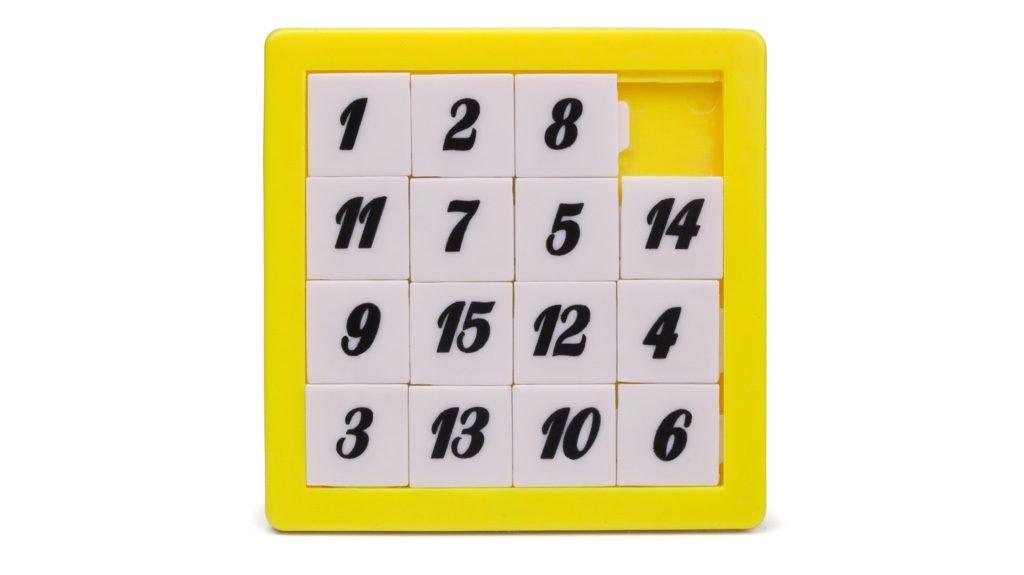Play sliding-tile puzzle with your time
Datum: 2017-02-27 10:46

If you have plenty of meetings but not plenty of time between the meetings to do all those things you promised you would do before next meeting, you are not alone. Many of my clients fill their days with meetings, but have difficulty finding the time for working alone and undisturbed with the tasks they need to complete.
Meetings have a tendency to be prioritized — perhaps because several other people are depending on that we can meet them during this or that particular time, while the time we spend working alone only requires one person to be present; yourself.
When every week is different from the next
In spite of this, most of us need a certain number of hours every week when we are not attending meetings in order to do all the tasks we have to do on our own.
But, how do we find those hours in a schedule filled with engagements? Sure, I have previously written about how we can schedule a set number of hours every week which are reserved for working alone on tasks so that we ensure that we have enough ”space” in our calendar to actually have time for everything. But what if some meetings tend to be unpredicted and you hence have difficulties predicting when to schedule those hours you need on your own? This would make it hard to really reserve that recurring time alone, wouldn’t it?
Well, no. You could always play sliding-tile puzzle with your time.
Do this
- Take a moment to think about how many hours you need every week which are free from meetings. Hard to estimate? Then make an educated guess of eight hours per week.
- Schedule eight separate hours of alone time sometime during this week in your calendar during the times you would prefer to be free from meetings if you were to schedule your ideal week. If you already have other things scheduled during the time you would most prefer to work alone, don’t worry. We’ll get there.
- Schedule the hours as individual hours, even if they are scheduled consecutively. So, do not create blocks of time. Instead of scheduling a block of three hours, create three separate bookings. This way it becomes much easier to shift and move them around later on.
- If you are not using one already, create a category or assign a color to this time spent working alone so that you can distinguish it clearly when viewing your upcoming week in the calendar.
- Set all the hours (all eight, for instance) as recurring so that they reappear in your calendar every week.
- Alright, let the game begin. The rules are:
- One hour of alone-time has to be spent doing things you need your alone-time for. You are not allowed to be double-booked (so if any ”alone-time hours” are placed where you actually have a meeting, they need to be moved now).
- You can move an hour of alone-time to any free space in the calendar during this week, but you cannot transfer hours this week onto next week. Meaning, you cannot ”save” an hour for next week.
- You are not allowed to remove an hour you actually need for working alone.
- Now, open up next week in your calendar. Rearrange the alone-time hours so that they all fit your schedule. If the calendar-software asks if you only want to move this particular unit of time or the whole series, select ”only this one” or the equivalent option.
- Once a week, perhaps as a part of your weekly run-through, play this sliding-tile puzzle with your alone-time for the next few weeks to come.
- If you are asked to attend a meeting during a time when you have scheduled alone-time, the same rules apply. But, you are not allowed to remove the hour, so if there are no other free slots during the week, you will have to reschedule the meeting for another week. (There are of course unusual, urgent exceptions when these rules no longer apply, but you will know when these occur.)
Done on time before next meeting
If you play sliding-tile puzzle with the hours you need to spend working alone, you will automatically get the time you need free from meetings every week. You will manage to do more of the things you promised others you would do, and will not have to excuse yourself during the next meeting with that ”you did not have time” to do what you said you would. And, if you are amused by the same things as I, you will enjoy this little game of time-management.
What is your method?
Do you have a way of ensuring that you have all the time you need to complete your tasks and assignments every week? Perhaps you have your very own method of doing this. Leave a comment to share your thoughts.




